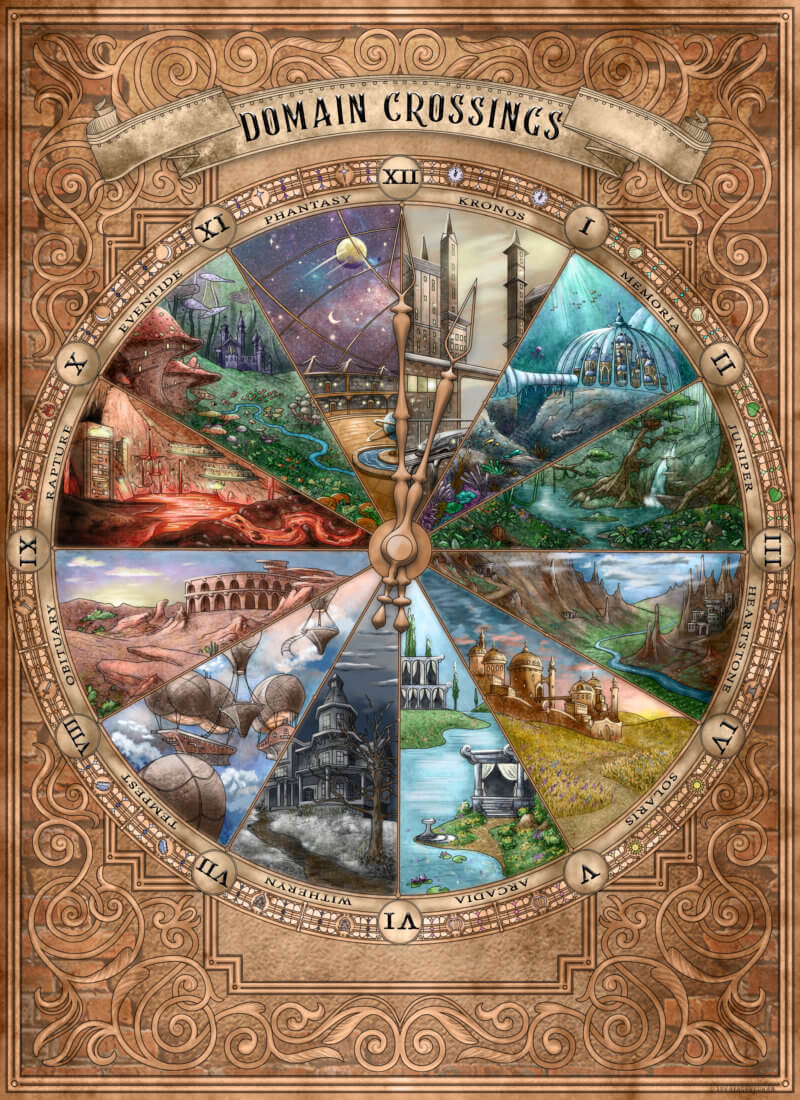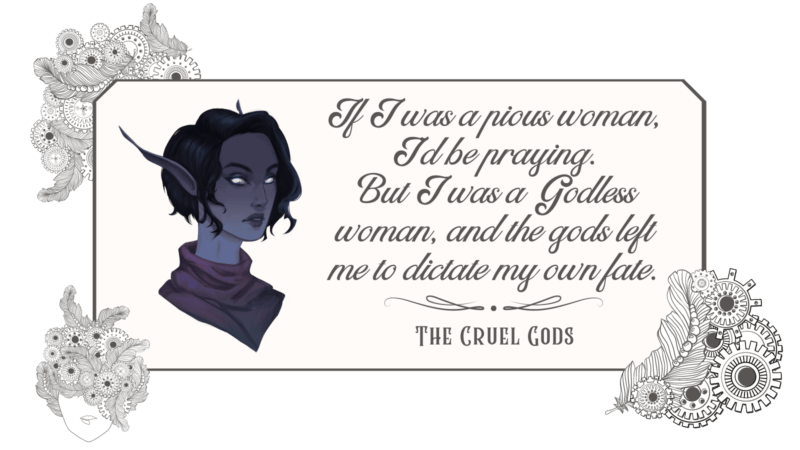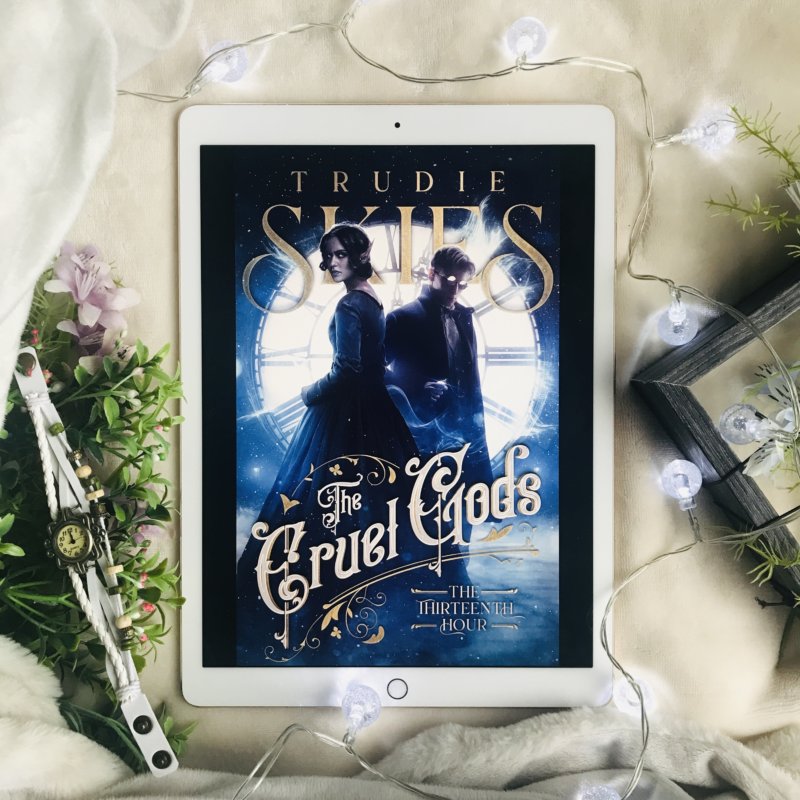After gushing over The Thirteenth Hour in the review and my January wrap up, I am super excited to spend more time in the world by hosting Trudie Skies! If you are a regular visitor of the blog, you have met her before. We have chatted about Young Adult Fantasy on my Creator’s Roulette series and she has shared her favorite indie recommendations – you can check those out later. Let’s welcome her and get started:
Trudie, it is such a pleasure to host you on the blog for an interview about your book! Please tell my readers a bit about yourself, in case they haven’t met you yet.
Thank you for having me, Kriti! I’m Trudie, a fantasy reader and writer from north-east England who is passionate about indie fantasy! My first book, Sand Dancer, is a YA fantasy series published by an independent press, Uproar Books. The Thirteenth Hour is my first adventure into self-publishing.
When not writing, I love reading and promoting indie fantasy books. I’m also a big fan of indie video games, which is my fourth favourite hobby after reading, writing, and napping.
I love the effort you put towards cover and character arts and that helped me tons in imagining this rich world. Do you remember the first time you thought of it? That spark of inspiration that you wanted to pursue? Can you tell us anything about the early development of this book?
Thank you! The original seeds for The Thirteenth Hour were planted when I was twelve. I came up with this story of multiple worlds all based around an element or combination of elements. The main character of Kayl lived in the dark half of an hourglass city and gained the ability to travel through portals between these worlds. She also had another soul trapped inside of her that gave her magical abilities and spoke to her. Sound familiar so far?
I worked on that idea for years, but when I came back to writing as an adult, I decided that the idea was too cringey and I couldn’t make it work. I thought it was going to become one of those early ideas that I shelved and moved on from.
Then when the pandemic hit, I started another playthrough of Skyrim and found myself inspired by the steampunk culture of the Dwemer, and the Daedric Princes who are gods of their own realms. This got me thinking back to the worlds of my old idea, and I began to rework it. It wasn’t just The Elder Scrolls that I took inspiration from, but also Final Fantasy VII, and His Dark Materials by Philip Pullman. Once I added in the steampunk/clockwork element, it all came together.
The main character of Kayl retained her name because it suited her place in this new world, though the soul inside of her changed a little. The character of Quen was largely new, and he just walked off the page! From there, I decided to write the most over the top world I could, throwing in British references as well, because it was – and still is – a global pandemic, which is surely the right time to write whatever feels fun!
And The Thirteenth Hour is the most fun I’ve had in a long time.
I went on so many thought trails while reading The Thirteenth Hour. One of them was thinking about what our world would look like if gods were indeed accessible and real. Having grown up with Hindu mythology which has numerous gods, I like to think of this book portraying the same, though how the gods themselves interact is yet to be seen. They are limited to their domains at the moment. As the first gods, are Dor and Corentine governed by the same rules of the domains? Was there a particular mythology that helped you with fleshing out this book?
The first book in The Cruel Gods series only introduces a few of the gods, but the subsequent sequels will open up the world and introduce even more. And a lot of them are very accessible – some even act like celebrities! Dor and Corentine are indeed governed by the same rules, in theory. To say anymore would be spoilers! But let’s just say that not all of the gods get along with each other.
I didn’t base these gods on any particular real-world mythologies or religions, partly because the vast majority of these gods are pretty nasty. But some of the religious questions that come up in the book between Kayl and Quen were based on discussions I had with my own Christian upbringing.

The concept of how gods toy with and exploit their mortals is fascinating. Why are they so self-centred and cruel?
They don’t see themselves as self-centered or cruel, that’s part of the problem! Part of it is also arrogance. They are almighty beings with the power to create domains and life, thus most of them don’t trouble themselves with mortal needs, nor do they understand mortal concepts such as aging and death on the same level that we do. To some of these gods, mortals are tools that they use to experience the world outside of their domains.
This is why they have a human ambassador to basically deal with all the petty mortal stuff they don’t want to think about.
What is it like to imagine and write about such diverse beings?
Tricky haha. I’ll admit some of them are based on fantasy archetypes, such as the Glimmer are like high elves, the Vesper are like dark elves, etc. I wanted to make them unique, but I don’t really go into their own domains or culture for most of them until the sequel – and even then, I think I’ll need to do short stories and spinoffs to really explore them.
I also wanted to make sure that not all mortals were the same. I stereotype them in book 1 by saying all Glimmer are snobs etc, but in the sequels, I want to introduce characters who go against their own stereotypes and show different sides to these domains.
When time stops by the power of a Diviner does it only affect a certain region around them or all of time?
Good question! I imagine it only stops a certain region around them, otherwise some Diviner from miles away is going to choke on their tea and yell “Ye gads! Who is pausing time now?”
Diviner are very sensitive to time and they get annoyed at other Diviner who manipulate it without good reason. But this also means they instantly know if there is another Diviner nearby who is abusing it. Since Chime has such a large Diviner population, and many Diviner work for the Wardens due to their sense of law and order, that means you’re probably not far from a Diviner at any time! A scary thought.
What does the gate look like from the world’s side?
From Chime’s side, you can see the massive arch that makes up the Gate under the clocktower. But when you pass through the Gate into a domain, the Gate changes to whatever is on their side. Each domain has their own unique Gate. For example, Memoria’s Gate is made from coral. When the crossing time passes inside a domain, their Gate effectively powers down and doesn’t turn back on again until the next crossing. If you happen to miss your crossing back into Chime, then too bad! You’ll be stuck there for twelve hours.
For mortals new to crossing into a domain, it can be a scary experience when the Gate powers down. But it always returns like clockwork.
Do you write the little passages under the chapter numbers before or after the chapter? (also I did notice how the chapter numeral changed between Kayl’s and Quen’s POVs. Smart!)
When I wrote the first draft, I wrote the epigraphs almost as a warm up or introduction to the chapter. I decided that they would try and fit the theme of the chapter where possible, and then as I went through the book, I started cutting out worldbuilding info dumps from the chapters and shoving them into the epigraphs instead. It felt like a cheeky way of cheating! When I finished the first draft, a lot of them were rewritten or moved around as necessary to fit the chapters.
For the sequel, I haven’t actually written the epigraphs yet. I know what some of them will be based on, but I decided to wait until the second draft is finished so I can tailor them to the chapter more.
And thank you! Not everyone noticed the changing chapter numbers at first!
One of the fundamental questions that has plagued Quen all his life is who controls his thoughts. He is one of my favourite characters of ALL time. Tell me about Quen!
Quen is my favourite character out of all the characters I’ve ever written, so I will be spending more time bringing him to life! Quen is a kind and optimistic soul who wants to see the best in everyone and believes everyone deserves a chance, which is why he spends so much time trying to help the downtrodden mortals of Chime that others of his race would be quick to dismiss. He’s a bit of a martyr, and sees himself as a hero – or wants to be. But he’s also a sinner, deep down, and the sequel will explore his more selfish nature.
Part of Quen’s arc is that he’s holding himself back – or rather his god is holding him back – and he’s not yet free to be the man he wants to be. But he’ll get his chance to shine!
I can’t quite ignore Kayl because I love her so much too. Tell me about her! What is your hope for her character in the coming books?
Kayl is a lot of fun to write because she’s a disaster in many ways. After writing a tomboy MC with anger issues for my YA series, I wanted to create a character that was completely different, and that’s Kayl. She’s feminine, playful, flirty, tall, and absolutely useless in a fight.
My hope for Kayl is that she’ll take on more responsibility and step up to achieve her goals of a better world for mortals. In the first book, she tries to prove herself, and bless her, she really does try. Like Quen, her heart is in the right place. The end of book one knocks her confidence a little, but by the end of book two, she’s going to become a character you don’t want to mess with!
What was the most challenging part of writing this book? I personally worry with Fantasy stories that have huge worlds that they would not be depicted well and you did such an amazing job unfolding the domains and the creatures in my mind.
I’d definitely say that conveying the world was the most challenging part. Honestly, I worried that this world was going to be a bit too over the top and confusing. Trying to fit in twelve worlds and races into one book? Who even does that? For the most part, I think I balanced, but I know some readers didn’t understand the world at first, or struggled to make sense of it, and that’s okay! There’s a lot going on!
If you’re really struggling with the world, I wrote a companion guide called The Handbook to Chime and Beyond which introduces the twelve domains and their mortals.
What is something readers can look forward to world-wise in the next book?
In book two, Kayl and Quen will be visiting the domains of the gods! Not only will we be able to see most of these domains for the first time, but we’ll also get to meet their gods. My favourite is probably Edana, the Ember god, because she’s a giant flirt. The Necro god is also quite terrifying. It’s going to be hard picking out which god is the worst because they’re all terrible.
The city of Chime has its special space in my mind. Do you have any favorite cities from fiction?
This is a great question! I’m a sucker for worldbuilding and fantasy cities. Three of my favourite cities are Daevabad from City of Brass by S. A. Chakraborty, Ketterdam from Six of Crows by Leigh Bardugo, and Yaelsmuir from Legacy of the Brightwash by Krystle Matar.
Do you have any favorite quotes from this book?
Some of my favourite quotes are the rude ones, but I’ll refrain myself! Here’s one from Kayl and Quen that I think introduces their characters:

“To trawl through my memories, my thoughts, my past, to see everything I’d been and everything I could become; it was a violation.
But he’d always enjoyed violating me.”
Quen
Which character do you associate with the most from this book? Is there a quiz readers can take to figure out their race in the domains? 😀
I think many authors give parts of themselves to their characters, whether intentional or not. Both Kayl and Quen represent different facets of me – Kayl’s playful nature and Quen’s desire to play hero. While writing The Thirteenth Hour, I related more to Quen than Kayl, and found his POV a lot easier to write.
From the domains, I definitely relate to the Mesmer! They love eating candy, napping, and generally daydream a lot or feel confused by reality. That’s me! A lot of people relate to the Diviner, which is a shame, because I don’t put them in a favourable light in the sequel!
You can find out which domain you’d belong to with this quiz on my website:
I had a lot of tea while reading this book and I will be making a hot toddy in the coming days (it might be the drink I have been looking for). Do you have a favorite tea, or one you enjoyed in particular while writing this series?
Okay so this answer is going to get me murdered – I don’t actually drink tea! I prefer my drinks to be cold! But I’m also more likely to drink coffee – sorry Quen!
I do like the occasional tea at times, I’m not a monster. Nothing can beat Quen’s favourite, the British classic – a teabag, a splash of milk, two sugars, and a bourbon biscuit.
And do you have a favorite scene from the book, one that you enjoyed writing and reading after? 🙂
Ooh I have two favourite scenes, and they’re both Quen chapters. The first is chapter 20 when we learn a bit more about Quen’s motivations and memory problems, though to say anymore would be a spoiler! The second is later in chapter 30 when Quen is forced to face these same memory problems and the consequences of them. I love the scenes where he’s questioning himself as well as the role his god plays in his life.
Last question, for someone who enjoyed your book, are there any books you would recommend them to read next?
I call The Thirteenth Hour a gaslamp fantasy, but gaslamp fantasy itself seems to be split between the more whimsical Regency fantasy, and a darker gaslamp world. Here are some indie books which cover both.
For more whimsical gaslamp fantasy, check out The Lord of Stariel by AJ Lancaster, The Fire in the Glass by Jacquelyn Benson, and Half a Soul by Olivia Atwater.



For more darker gaslamp fantasy, I recommend Legacy of the Brightwash by Krystle Matar, and We Men of Ash and Shadow by HL Tinsley.
Hope you enjoyed this interview! Here is some info about the book if you haven’t read it yet.
The Thirteenth Hour
by Trudie Skies

When the saints fail, the sinners step up.
Cruel gods rule the steam-powered city of Chime, demanding worship and tribute from their mortal subjects. Kayl lost her faith in them long ago, and now seeks to protect vulnerable and downtrodden mortals from their gods’ whims. But when Kayl discovers powers that she didn’t know she had—and destroys a mortal’s soul by accident—she becomes Chime’s most wanted.
Quen’s job was to pursue sinners, until the visions started. Haunted by foreboding images of his beloved city’s destruction, Quen hunts soul-sucking creatures made of aether who prey on its citizens—and Kayl is his number one target.
To ensure Chime’s future, Kayl and Quen must discover the truth of Kayl’s divine abilities before the gods take matters into their own hands.
For a city that bows to cruel gods, it’ll take godless heathens to save it.
The Thirteenth Hour is the first book in The Cruel Gods series—a gaslamp fantasy featuring magical portals, gothic cosmic deities, quaint Britishisms, and steampunk vibes. This is an adult book containing strong language and mature themes that some readers may find disturbing.
Content Notes: For a full list of content warnings, visit Trudie Skies’s website.
Add it to your shelves on: Goodreads, Storygraph and Indie Story Geek. Buy it on Amazon, available on Kindle Unlimited.
Thank you for hanging out with Trudie Skies and me today!
Connect with her on Twitter, Facebook, Goodreads, and her website.
Cover image: Photo by Fabrizio Conti on Unsplash

Be First to Comment